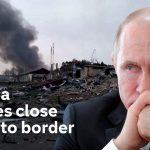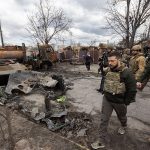There is a strikingly common thread among editorials concerning Russia’s invasion of Ukraine. Whether in support of or opposition to the war, we invariably find blame laid at the feet of the North Atlantic Treaty Organisation’s (Nato) expansion and the failure to consider Russia’s “legitimate security concerns”. There are only two ways in which one can blame Nato for this war, and each has its problems.
In my own field of International Relations, we find those who speak of “balances of power” as if they are eternal and law, rendering Nato expansion objectively a threat. Were that so, then we should expect to see imbalances of power kicking off all manner of wars. The historical record, however, does not support this claim.
The other possibility is perception, and I have no doubt that Russia certainly perceives a threat and may well have its own logic for why this is so. But rather than focus on Russia, we might ask why its neighbours similarly perceive it to be a threat.
However, hypothetical today, Ukraine would not be the first Russian border state to join Nato. That honour belongs to the Baltic states of Lithuania, Estonia, and Latvia – all of whom joined despite and because of persistent military harassment by Russia that continues today. As in Ukraine, Russia has similarly claimed to speak for various Russian-speaking peoples throughout the Baltic, and indeed elsewhere.
Like Ukraine, the Baltic states view their time in the Soviet Union as little more than an occupation, and you will find monuments and museums to this effect in each of these nations. Russia’s actions since the dissolution of the Soviet Union have done little to dissuade the leaders of these states that the lessons of history should be laid to rest in light of new facts.
These countries, like many others neighbouring Russia, have legitimate security concerns as well, and Russia has done little to address them.
However much Putin speaks of Nato, he is clearly disturbed by not just Ukraine’s desire to join but also by its shift towards the European Union. And why wouldn’t Ukraine look away from the sclerotic, oligarchic economy in Russia toward the far more dynamic Europe? Russia wishes to play a role in the politics of all its neighbours, and what it cannot offer by way of incentives it offers by threat and manipulation.
However delusional Russian President Vladimir Putin’s view of history may be, we should nonetheless take him seriously. It matters that Putin erases the history of the Ukrainian people. And it matters that he grieves the loss of the Soviet Union and its status for he is prepared to bring about his vision regardless of any deferential diplomacy by Nato or Europe.
Russia, or more specifically Putin, has created the very beast it fears and I can find no honest or ethical reason to lay this war at the feet of anyone else.
DERICK BECKER, PhD
Assistant professor
Politics, History and International Relations
University of Nottingham Malaysia



